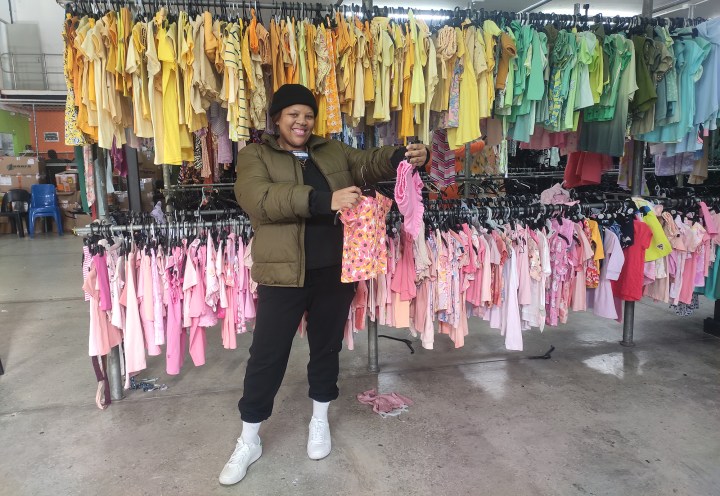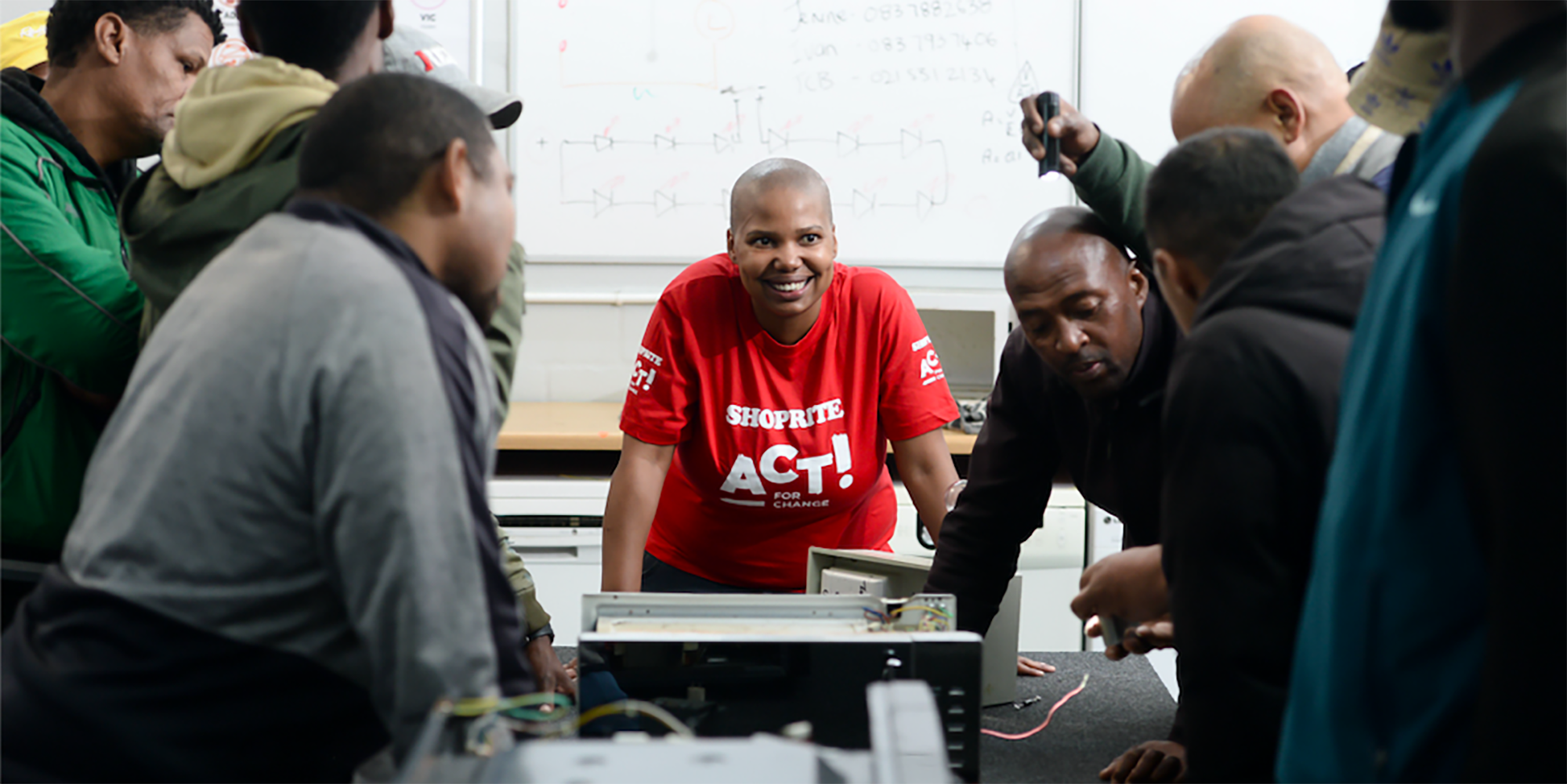SELF-EMPLOYMENT
How do you grow an entrepreneur? You equip them – and make entrepreneurship sexy

Entrepreneurship in the informal sector is one of the silver bullets to addressing poverty. A non-profit social enterprise backed by major retailers has worked for more than a decade in Cape Town, Paarl, Durban, Johannesburg and East London to 'grow' entrepreneurs to support the circular economy.
Originally set up as The Clothing Bank, Taking Care of Business (TCB) co-founder Tracey Chambers says self-employment and entrepreneurship, especially in the informal economy, play a critical role in helping the underprivileged break free from the intergenerational cycle of poverty.
South Africa needs all the help it can get: the latest Global Entrepreneurship Monitor survey, released with the University of Stellenbosch Business School, rated our entrepreneurial ecosystem as one of the most challenging in the sample of participating economies, coming in at 49th out of 54 economies, ahead of only Croatia, Guatemala, Paraguay, Puerto Rico and Iran.
Trading up
Fear of failure is high at 49.8% among South Africans and is deterring people from starting a business.
The informal sector, an essential source of income for many poor South Africans, accounts for about 18% of the country’s GDP – and can grow so much more.
SA needs more informal opportunities that will encourage and support people to start their own micro business, she says, which is why she and her partner, Tracey Gilmore, set up TCB in 2010, to equip unemployed mothers to become fashion traders within the circular economy.
Chambers, who hails from a retail background, says retailers lack backroom storage space for their unwanted stock. To manage this, retailers would donate off-season, returned or damaged stock to charities. But often the donations were inappropriate: you’d see adult underwear, makeup and handbags being delivered to an orphanage, when all they really needed were 50 babygrows.
It’s wasteful and inefficient.
To solve this problem, TCB would “sweep” malls for excess stock, return it to their distribution centres and dole it out to charities – based on needs – as well as their entrepreneur network, thereby leveraging supply chain waste with willing sellers in poor communities.
“We have contracts with all the major retailers who donate all of their excess product to us, including end-of-season products, customer returns etc. We use that product to help a woman start a business.”
TCB’s typical mother is on average aged 37 with 2.3 children – many of whom are young.
“We knew that if we could change the life trajectory for a mother, we could change the trajectory for her children.”
At their distribution centre in Thornton, Cape Town, boxes lie waiting each day for entrepreneurs to pick through. Every box is a lucky packet, but today there’s a pile of goodies from Truworths, which explains the excitement. Occasionally, there will even be stock from Woolworths’ Country Road.
Everybody gets a fair turn at the piles of premium Truworths stock and can select as much as they want from the rails of neatly arranged clothing, which they buy at significant discounts.
They take pictures of every item of clothes, shoes and other products, upload it on to their WhatsApp status, and by the time they leave, most of it has already been sold through their own networks of clients.
It’s all part of the training: they’re taught how to set up the groups, take good photographs and price correctly.
They’ve come far: Thirteen years ago, many women did not have bank accounts, Chambers says.
“It’s been really interesting. We had a good relationship with Capitec, which used to come in with a printer, help them open accounts and print cards. That’s not necessary anymore. Our women are banked. She knows how to use internet banking. She’s au fait with banking on her phone.”
Superstar mom
Lisa Ndlovu is an alumna of the programme and a “Superstar” – selected among only four others to work as ambassadors who help other sisters along the way.
A single mother of two, Ndlovu lost her job in 2020. She went online, found TCB and applied. Her life has turned around, she says.
“My business is doing very well. I have a stand in front of the taxi rank and have so many customers that I’ve even hired someone to help. I pay someone to help me and they can feed their family. And I’ve built a flat for myself. It’s been difficult but you need to stay focused.”
Chambers says they want to make entrepreneurship sexy in South African culture:
“It’s sexy in other African cultures, but in South Africa, not yet. These women are mothers who go from zero flexibility in a job – having to get into a taxi at six to get to their job as a cashier by 8am and then get home at 8pm. She couldn’t be there for her children. Now, she can hustle and she’s making a good living. The women in our programme eradicate poverty and their families do well.”
In this branch, there are 250 women in the two-year programme and one of the requirements is that they have to give a day’s service to TCB to help process product.
“Basically, we have some employees, but most of the work is done by the women themselves. They are packing for charities or sorting the goods that they’re going to buy.”
Evolved
The Resell programme has evolved to include Remake and Repair programmes, which now also train seamstresses to run viable businesses and men to repair returned appliances that they resell.
Through their Remake programme, they have benefited from substantial donations of raw materials, including fabric and trims, from Truworths and TFG, and repurposed uniforms from Jonsson Workwear.
Their Repair programme, open to men too, was previously known as The Appliance Bank. The two-year enterprise development programme helps unemployed people who have technical skills to become appliance repair and resell traders.

Makaziwe Mazaleni (centre), who is about to become the first graduate of TCB’s Repair programme. (Photo: Supplied)
Thirty-year-old Makaziwe Mazaleni is about to become the first female graduate of Repair, which is supported by Shoprite, Clicks and other retailers. The programme currently has 17 female participants – eight in East London, five in Midrand and four in Cape Town.
Since the inception of the partnership in 2017, Shoprite and Checkers in the Western Cape, Gauteng and KwaZulu-Natal have donated appliances valued at more than R21-million to assist beneficiaries of the programme.
Growth
Much of their work is around having a good relationship with money.
“We measure 50 indicators related to poverty eradication. The first thing a mother would spend on was her home; the second was education. What we found was that she spent the most on transporting her children to a better school,” Chambers says.
Family remains at the centre of their story, with the expansion into the GROW Educare Centre programme, to support early childhood development through an approved curriculum, educational materials and an app on which owners can monitor performance, finances and developmental milestones.
That’s because mothers would want a better quality of education for their children and be prepared to pay for it, but they couldn’t find the quality they were looking for in their neighbourhood.
“Many people running ECD centres think of it as a charity, even if they started to make an income… they don’t know in most cases that they are making a loss. There are 200,000 teachers employed in early learning centres in SA and more than 80% of them are paid below minimum wage.
“So we’re really trying to educate women about this so they can step into the persona of a social entrepreneur because that’s essentially what she is. We help her to understand how to run a proper business.”
GROW currently has 39 franchise centres and 90 programme centres which are not full franchises.
Since 2020, GROW’s app has been available, free. This means everything from teacher training to communicating with parents, lesson planning, alerts and more.
About 2,600 ECD centre owners are now regularly using the platform to improve their businesses, which affects 31,000 children.
More than 60% of mothers in South Africa are single and most fathers provide no financial support, says Chambers.
“So that was the founding principle – help a mother, help a child – which is why to get into this programme, you have to have at least one dependent child.”
It’s hard, especially because they also have to turn many women away, but they wanted to focus on the double impact by measuring the effect on the children and how it breaks the cycle of poverty. DM



















Comments - Please login in order to comment.